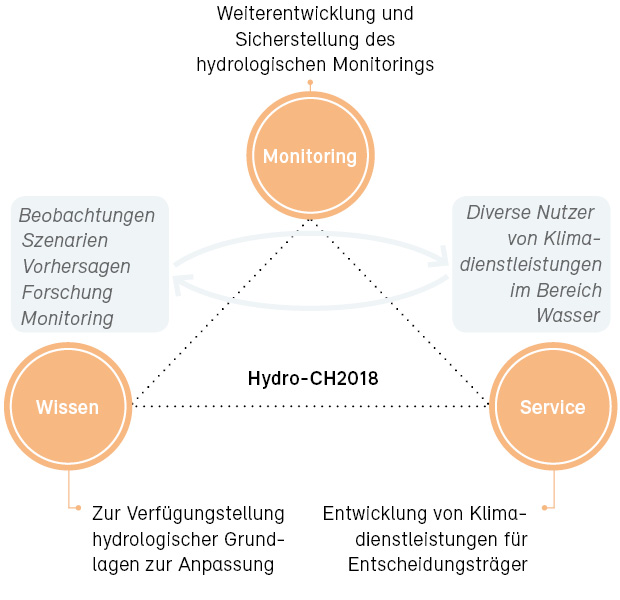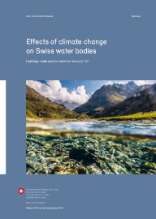The core topic of the NCCS Hydro-CH2018 focusses on the water resources and their future development. The objective is to supply the necessary fundamental hydrological principles for adaptation.

Climate change affects the entire water cycle. The temporal and local availability of surface waters and groundwater changes, as do water quality and ecology. Many economic sectors are affected, including hydropower, water supply, urban drainage, flood protection, tourism, navigation and agriculture. Before measures to enable Switzerland to adapt to these changes can be formulated, the processes of the water cycle and their evolution must be better identified and understood. This requires both continuous monitoring of the changes in the water cycle and an understanding of the central physical and chemical processes and their interaction. The Hydro-CH2018 programme therefore investigates the fundamental hydrological principles of climate change in Switzerland, under the direction of the Hydrology Department of the FOEN and in collaboration with leading research institutions.

Objectives
Hydro-CH2018 is developing an up-to-date knowledge base on the impact of climate change on the water cycle and water management. It will later be made available to specific target groups in the sectors affected, to support adaptation to climate change in the water sector.
The specific main themes of Hydro-CH2018:
- Production of hydrological scenarios based on the new CH2018 climate scenarios
- Climate-specific continued development and safeguarding of the hydrological monitoring
- Enhanced understanding of the hydrological process
- Provision of the fundamental scientific/technical principles necessary for the adaptation measures
Products

Synthesis report
This report will provide a user-friendly synthesis of the latest body of knowledge in the field of hydrology and water management and recommendations for adaptation to climate change.
Cryosphere (Glaciers, Snow, and Permafrost) by:
Snow: Hydro-CH2018 Synthesis Report Chapters: "Future Changes in Hydrology“ (EN)
Glaciers: Hydro-CH2018 Synthesis Report Chapters: "Future Changes in Hydrology“ (EN)
Participating institutions:
ETH Zürich: Versuchsanstalt für Wasserbau, Hydrologie und Glaziologie
WSL: Gletscher und polare Eisschilde
Water balance and droughts by:
Soil moisture and evapotranspiration (EN)
Soil moisture and evapotranspiration - Appendix (EN)
Participating institutions:
ETH Zürich: Institute for Atmospheric and Climate Science
Runoff regimes by:
Veränderung der Abflussregimes der Schweiz in den letzten 150 Jahren (DE)
Participating institutions:
Universität Bern: Gruppe für Hydrologie
Floods by:
Hydro-CH2018: Past, current, and future changs in floods in Switzerland (EN)
Participating institutions:
ETH Zürich: Chair of Hydrology and Water Resources Management
Université de genève: Climate change impacts and risks in the anthropocene (C-CIA)
Sediment transport by:
Auswirkungen des Klimawandels auf den Sedimenttransport (DE)
Participating institutions:
HSR Rapperswil: Institut für Bau und Umwelt
Low water by:
Charakterisierung von Niedrigwasserregimen (DE)
Participating institutions:
ETH Zürich: Chair of Hydrology and Water Resources Management
Water temperature by:
Evolution of stream and lake water temperature under climate change
Participating institutions:
École polytechnique fédérale de Lausanne EPFL
Water quality and ecosystems by:
Climate change and freshwater ecosystems (EN)
Participating institutions:
Groundwater:
Effect of Climate Change on Groundwater Quantity and Quality in Switzerland(EN)
Participating institutions:
Centre for Hydrogeology and Geothermics of University of Neuchâtel
Schweizerisches Institut für Speläologie und Karstforschung (DE)
Impacts on water management by:
Auswirkungen des Klimawandels auf die Wasserwirtschaft der Schweiz (DE)
Participating institutions:

Research projects
By means of targeted research projects and based on the new CH2018 climate scenarios, existing knowledge deficits will be covered and a broad, up-to-date knowledge base will be created. Many Swiss research institutions are involved.

Water climate services
Users will be supplied with scientifically correct and intelligibly processed data and information on climate change and its consequences for water management on which to base their decisions, so that climate-induced risks can be identified and opportunities exploited (so-called climate services).
Highlights
Last modification 16.03.2021








